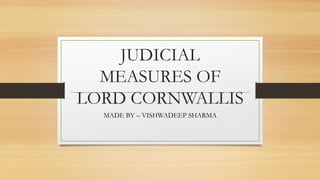
Judicial measures of lord cornwallis
- 1. JUDICIAL MEASURES OF LORD CORNWALLIS MADE BY – VISHWADEEP SHARMA
- 3. INTRODUCTION • Lord Cornwallis was the famous British General, who was sent to India in 1786 with the charge of the land settlement policy of the Government. • The governor-generalship of lord Cornwallis which extended from 1786 to 1793 • Cornwallis introduced changes in the judicial system thrice in years 1787,1790, 1793 • He introduced for first time the principle of administration according to law
- 5. JUDICIAL SYSTEM OF 1787 • The judicial scheme of 1781, introduced during Warren Hasting’s governor- generalship, envisaged a division of revenue and judicial functions • After Warren Hasting left voice raised against the system by the company’s senior servants who advocated merger of the two functions in the same hands • It was very costly to maintain two distinct organization for the administration of revenue and judicial functions. • Sir John Shore senior and able civil servant, who later succeeded Cornwallis as the Governor-General on 13th January 1785
- 6. • He stated that the Indians had lived under an “arbitrary and despotic” government and therefore the form of the British government should be despotic • He said it was impossible to draw a line between the revenue and judicial departments with the result that they continually clashed in practice. • When force was applied to collect land revenue, a complaint was made to adalat which make collection very difficult. • Later the collectors were made judges and thus collectors became more powerful, they interfere in revenue collection cases.
- 7. DEFECTS OF JUDICIAL SYSTEM 1787 • A magistrate, the collector was to arrest criminals and punish petty offences by corporal punishment and not exceeding 15 strokes, or imprisonment not exceeding 15 days. • All cases meriting a greater punishment were to be sent by him to the nearest moffusil fozdari adalat for trial and punishment.
- 8. JUDICIAL SYSTEM OF 1790 • In 1790 Cornwallis tried to reform the criminal justice system which was following Muslim criminal law system and Mofussil Fauzdari Adalats were controlled by Qazis, muftis and moulvies. • Everything was controlled by Naib Nawab Raza khan and who was not answerable to anyone • The salaries of the criminal court judges were very low which encouraged them to get involved in the corruption. •
- 9. • Low salaried kept honest and educated people away from this job and every corrupt man wanted to become the criminal court judge. • Fozdari adalats did not give fast justice, it delayed the justice. • Delayed justice encourages criminals to do more crimes. As they do not fear the law.
- 10. DEFECTS OF JUDICIAL SYSTEM OF 1790 • Lot of work for court of circuits • No provision to supervise the collectors, who got unlimited powers • Cornwallis understood the defects of the above schemes and He introduced the plan of 1793.
- 11. JUDICIAL SYSTEM OF 1793 • In May 1793, the Cornwallis code emerged as a legal code, representing a compilation of forty eight regulations. • In Bengal, the code provided for the Governor-in Council to form both the Sadar Diwani Adalat (civil) and Sadar Nizamat Adalat (Criminal). • The Cornwallis code further established four Provincial Courts of Appeal located in Calcutta, Murshidabad, Dacca and Patna. • These courts handled cases on appeal from the District Courts of Bengal to prevent overloading the Sadar Diwani Adalat in Calcutta.
- 12. • They consisted of three English judges which were later raised to 4. • Cornwallis code of 1793 removed the judicial duties formerly held by the collector and passed them to the Diwani Adalat established in each district it included guidelines for the appropriate for Hindu or Mohammedan laws. • In order to reduce the case loads at the district level, commissions consisting of Indian officials were developed to hear cases not exceeding 50 rupees in value.
- 13. • The Cornwallis code provided for the appointment of vakils or Indian pleaders to serve in the courts of civil judicature in Bengal, Bihar and Orissa. • In 1793 the position of the law officer developed within the judicial system, in Bengal and then later in the other presidencies. • In 1795, Lord Cornwallis revived a system of fees or stamp duties on cases to discourage the introduction of frivolous cases in Bengal. The fee structure was further enhanced in 1797.
- 14. BRITISH GOVERNMENT RULE IN INDIA
- 15. THANK YOU
